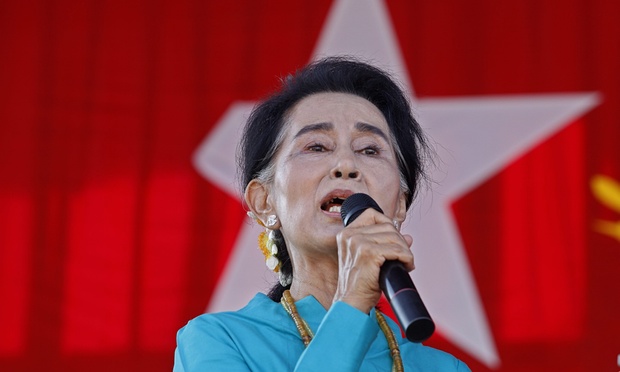Naing/EPA
Oliver Holmes in Bangkok and Jason Burke in Delhi
Wednesday 7 October 2015 10.41 BST Last modified on Sunday 11 October 2015 12.27 BST
Share on Pinterest Share on LinkedIn Share on Google+
Shares
319
Comments
111
Save for later
Aung San Suu Kyi, Myanmar’s opposition leader, has said she plans to lead the country if her party triumphs in forthcoming parliamentary elections despite a ban on her serving as president, indicating there will be a fierce post-poll battle with the country’s entrenched military rulers.
Her party, the National League for Democracy (NLD), is expected to win the polls, but Aung San Suu Kyi, who received the Nobel peace prize in 1991, is barred from the presidency due to a constitutional provision that excludes those with foreign children from the office.
Her late husband was British and she has two British sons and the clause was specifically aimed at denying her the post.
“If the NLD wins the elections and we form a government, I am going to be the leader of that government whether or not I am the president. Why not?” she said in an interview with prominent Indian journalist Karan Thapar to be broadcast by the India Today TV network on wednesday. “Do you have to be president in order to lead a country?”
Aung San Suu Kyi said “the constitution will have to change to allow civilian authorities to have the necessary democratic authority over the armed forces” – a direct challenge to the powerful military.
“I am sure they won’t like it. I don’t expect them to like it,” she said. “But I do believe there are many members of the army who want what is best for the country and if we can agree with one another what would be best for the country then we can come to the arrangement.”
The 8 November election is for seats in both houses of parliament for five-year terms. About 30 million people are eligible to vote, and 90 parties are contesting it. The military, however, is guaranteed a quarter of the seats under the constitution it drafted.
Advertisement
A president will not be chosen until early 2016 after elected MPs have nominated two candidates. MPs appointed by the military nominate a third candidate, and then all parliamentarians vote to determine who becomes president.
As a quarter of seats in parliament are reserved for the army, the NLD will have to win 67% of the vote for a majority.
It is unclear if during that transition period the parliament would be able to amend the constitution to allow her to be nominated as president or to change the system of government. Parliament failed in June to amend the clause.
“You wait and see and hope I win the elections 100% to see what I have in my mind,” she said.
The hour-long interview with Thapar was the first Aung San Suu Kyi has given since August. That it was granted to an Indian network is an indication of how important the emerging south Asian power is to her and the senior leadership of the NLD, even though Delhi failed to support her and other pro-democracy campaigners.
Formerly known as Burma, Myanmar emerged from international pariah status when a semi-civilian government took power four years ago following decades of military rule.
However, the ruling Union Solidarity and Development party is in effect a political extension of the military and the NLD and activists have criticised widespread economic reforms pushed through while, despite some releases, many political prisoners remain in jail and the media is strictly controlled.
Advertisement
“They have been cracking down on the press since about a year ago, and there are a few journals and news weeklies that are bravely carrying on the fight but a lot of our media are learning to self-censor to a certain extent,” Aung San Suu Kyi said on Wednesday.
The politician also expressed concerns about the electoral roll and the political sympathies of the election commissioner, the senior official overseeing the poll.
The army regime have a history of tough action when their power is threatened. A landslide victory by the NLD in the 1990 general elections was ignored by the junta. Aung San Suu Kyi, now 70, spent 15 years since then under house arrest.
In August, the military dismissed parliament speaker Shwe Mann, a rare member of the establishment who was also an ally of Aung San Suu Kyi, from his post.
Aung San Suu Kyi, known locally as “the Lady”, has asked the world to keep its eye on the country after the elections.
She rejected recent criticism that she has not been sufficiently outspoken against sectarian violence in her country, particularly attacks on the Rohingya Muslim minority in the west of the country.
She said she was restricted by laws against mixing religion and politics but expressed concern about rising religious intolerance in Myanmar.
There has also been criticism of her dominance of the pro-democracy movement in her country, and doubts over her ability to make compromises or deals some say are necessary in day to day politics as a leader.
“I have always been a pragmatic politician,” she said. “I have always said I don’t like to be called an icon, because icons do nothing except sit on the wall. And I have had to work very hard.”








